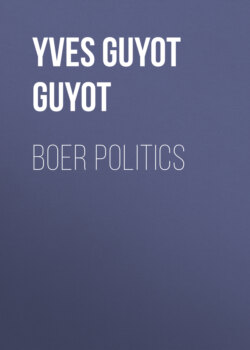Читать книгу Boer Politics - Yves Guyot Guyot - Страница 6
На сайте Литреса книга снята с продажи.
Pro-Boer Argument.
ОглавлениеPro-Boers refuse to recognise this point, as did M. Cavaignac when, in his speech of July 7th, 1898, he abandoned the "bordereau" to substitute for it the Henry forgery.
They keep talking of the Great Trek of 1836; of England's greed; of the gold mines; and, above all, of the Jameson raid. The Jameson raid is their pet grievance; it takes the place of all argument. The Uitlanders may well say that "Jameson has been Krüger's best friend."
Notwithstanding, the Jameson raid is the best proof of the powerlessness of England to protect the interests of her subjects against the pretentions of the Pretoria Government.
In 1894, Lord Ripon had already made ineffectual representations to that Government concerning the contempt with which it was treating the Convention of 1884.
The Uitlanders had approached the Volksraad in a petition signed by 14,800 persons. The petitioners did not ask that the Republic should be placed under the control of the British Government; on the contrary, they postulated the maintenance of its independence; all that they asked was for "equitable administration and fair representation." This petition was received with angry contempt. "Protest, protest as much as you like," said Mr. Krüger, "I have arms, and you have none."
It is contended that if President Krüger did provide himself to a formidable extent with munitions of war, it was not until after the Jameson Raid.
Here the connexion between cause and effect is not very clear; Jameson once beaten there was no further cause to arm against him. But from the Uitlanders' petition, to which allusion has been made, it is evident that armaments had begun before. Among the alleged grievances we find the following:—
"A policy of force is openly declared against us; £250,000 have been expended on the construction of forts; upon one alone, designed to terrorise the inhabitants of Johannesburg, £100,000 has been spent. Large orders have been given to Krupp for big guns and maxims; and it is said that German Officers are coming to drill the burghers."
The Uitlanders of Johannesburg treated with contumely, adopted the theories made use of by the Boers in their Petition of Rights of February 17th, 1881, by which they justified their insurrection against British rule, of December, 1880.
"Then the cause was unexpectedly helped on by the courageous resistance of O. Bezuidenhout against the seizure of his household effects for non-payment of taxes. Here was a breach of the law easy to lay hold of; here was a crime indeed! It was illegal, undoubtedly, but illegal in the same sense as was the refusal of Hampden to pay the four or five shillings "ship money"; the taking of den Briel by the Watergeuzen (Waterbeggars) in 1572; as was the throwing overboard of a cargo of tea in Boston; as was the plot in Cape Colony against the importation of convicts. All these acts were illegal, but of such are the illegalities in which a people takes refuge, when a Government fails in its duty to a law higher than that of man."
In virtue of the principles invoked by the Boers, the Johannesburg Uitlanders entered into a conspiracy; Jameson was to come to their aid after they had risen. Messrs. Leonard and Phillips put themselves in communication with Cecil Rhodes. He listened to their manifesto, and the instant they came to the mention of free trade in South Africa, he said: "That will do for me." The supposition that he desired to annex the Transvaal is absurd.[1] He has admitted that he gave his personal co-operation to Jameson without having first consulted his colleagues of the Chartered Company. Jameson was to have gone to the assistance of the Uitlanders; not to forestall the insurrection, which was fixed for January 4th. On December 29th, Jameson invaded the Transvaal with 480 men. They got as far as Krugersdorp, about 31 miles distant from Johannesburg, and after a fight at Doornkop, in which the Raiders' losses were 18 killed and 40 wounded, and on the Boers' side four killed and five wounded, they surrendered on the condition that their lives should be spared.
That stipulation is forgotten when we fall to admiring President Krüger's magnanimity in handing over Jameson to the British Government.
